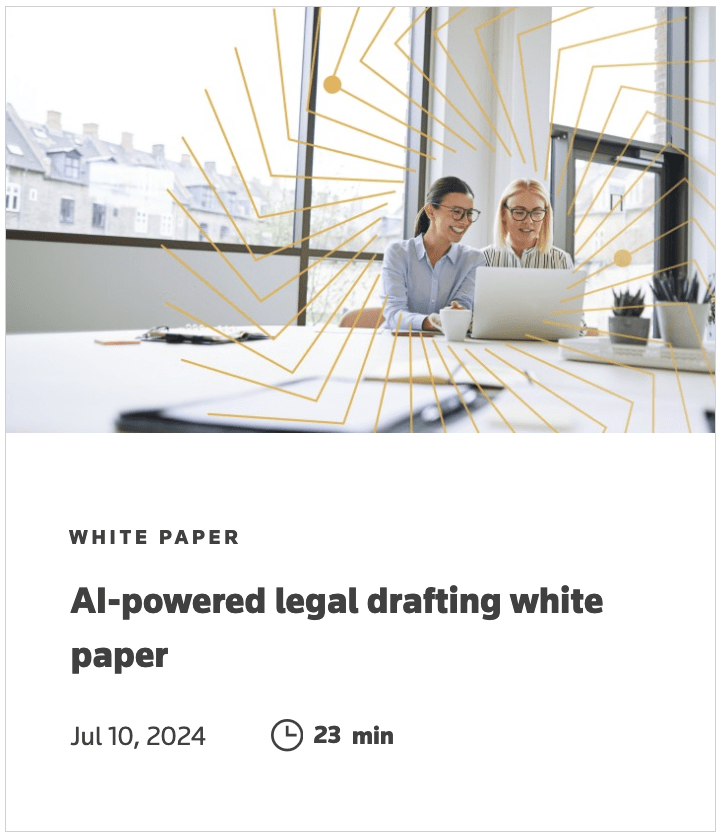Is legal drafting an art or a science? Maybe a little of both. Legal drafting is an organized method of writing a legal document created by identifying facts and laws and applying them to draft a document that is relevant and accurate.
All lawyers know that the legal document they are drafting must be comprehensive, but not encumbered with extraneous language, and always fit for purpose. Yet, despite spending as much as 56% of their time drafting documents, according to research by Thomson Reuters, they still spent in excess of 15 minutes identifying a good starting point for their draft. So, what keeps lawyers from working more efficiently and effectively when they draft legal documents?
Let’s review the real challenges and promising solutions.
Jump to ↓
Drafting can be time-consuming and inefficient
Drafting is a multifaceted process
The drafting solution for legal professionals
Drafting can be time-consuming and inefficient
No surprise here – time is a constraining factor for most legal professionals, as lawyers spend between 40 and 60% of their time drafting legal documents and reviewing contracts. Drafting has been a pain point and necessary evil of legal work that, until now, hasn’t had the breakthroughs or technological leaps forward that have been needed, or that AI could deliver on.
Think about it: Is there anything you spend 40-60% of your time doing in your workday? What if you could delegate many of those tasks to legal AI and get on to the next important, more strategic work versus slogging through cumbersome tasks?
Accuracy concerns
There’s no latitude when it comes to the accuracy of legal documents. A draft of a legal document needs to be comprehensive, but not encumbered with extraneous language, and customized to a specific task. At the same time, it should be consistent with other related documents. Even a minor error can have major effects. Slight inaccuracies can cast doubt on an entire document, meaning a contract could be considered void. Legal professionals need to ensure their documents are 100% accurate, up-to-date, and compliant.
Consistency and formatting are also imperative. Some documents need to comply with specific formats or content requirements to be valid. And both corporations and law firms often require consistency within their work product.
Drafting is a multifaceted process
Drafting documents is cumbersome for a number of reasons, including the variety of inputs, variation in legal requirements, countless revisions, and competing priorities. Version control and collaboration are essential – and can be a headache. Legal documents aren’t (and shouldn’t be) drafted in a vacuum. That means there are multiple sets of eyes on a document and multiple versions to manage. Wrangling feedback from numerous sources, while maintaining a coordinated draft can be a double whammy of time and accuracy issues.
Finding a starting point
Nothing is more frustrating than starting from scratch on a document when a similar one exists somewhere in an organization’s vast knowledge base. Finding the most pertinent and most current document to use as a starting point is essential. Similarly, searching for the right legal precedent as a reference goes beyond just saving time and gets directly to the heart of a matter.
The drafting solution for legal professionals
Legal professionals won’t be surprised to hear that artificial intelligence is a promising option for relieving many of these drafting problems. AI has been called transformational in business, entertainment, education, politics, and personal applications. As it advances in the legal field, lawyers can use it to relieve some of their biggest challenges.
In the legal industry, it can provide accuracy and time-saving benefits.
Delegating non-expert tasks
Lawyers know that the less time they spend on tasks that don’t require their legal expertise, the more they can spend on strategic goals and delivering greater value to their clients and organizations. And it’s not just lawyers who struggle with time constraints. Paralegals and legal assistants, who often support multiple lawyers, can relegate tasks like legal research, document review, and contract analysis to AI. When legwork tasks are handled with technology (plus the thoughtful overview of professionals), everyone’s workday becomes more predictable – and satisfying.
Digging deeper without the rabbit holes
Sometimes, lawyers’ expertise and intuition tell them to dig deeper when preparing legal documents. Whether they’re searching for a document, a clause, or a precedent, finding the right information quickly can be difficult. By using AI applications with simple language search commands, legal professionals can uncover what’s needed without the pull of random corners of the internet that can draw time and attention away. New AI tools can also bring disparate legal resources under one system – keeping lawyers from jumping from one platform to another.
Trusting the system
Artificial intelligence requires training. It needs to know where to search for information, and how to synthesize and interpret expertise from various sources. For legal applications, AI needs to be trained on expert, reputable, and pertinent legal data. More data isn’t always better data. Legal professionals, including knowledge management executives, should look for solutions that have been built on curated legal information. A tool that has been trained on the universe of public content may return results that aren’t targeted or trustworthy.
Getting on board with new technology
Regardless of whether drafting legal documents is the most- or least-favorite task in a lawyer’s daily schedule, it makes up a substantial portion of it. Just as the internet changed legal workflow in the late 20th century, the advancement of AI in the legal industry streamlines tasks and can improve outcomes. For legal professionals in law firms, corporate legal departments, or government agencies, how you choose to leverage AI can be a competitive advantage, but as GenAI is poised to transform how legal work gets done, having a strategy will soon be table stakes.











